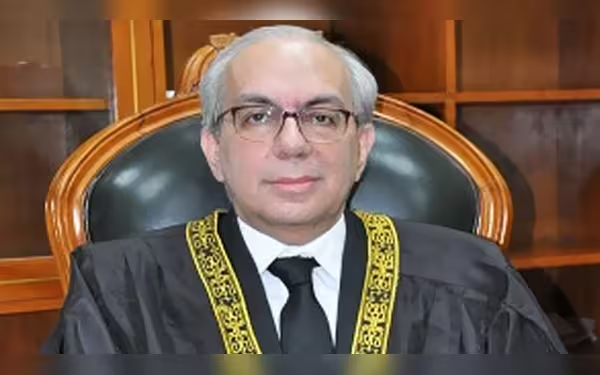Friday, October 4, 2024 06:21 AM
Justice Munib Akhtar Protests Supreme Court Bench Proceedings
- Justice Munib protests against Supreme Court bench composition.
- Concerns raised over judicial procedural integrity.
- Implications for political stability and democracy in Pakistan.
 Image Credits: thenews.com.pk
Image Credits: thenews.com.pkJustice Munib Akhtar protests against Supreme Court proceedings, raising concerns over judicial integrity and political stability in Pakistan.
In a significant development within Pakistan's judicial landscape, Justice Munib Akhtar has publicly protested against the proceedings of a Supreme Court bench. This situation arose from a review petition that challenges the Supreme Court's verdict regarding the defection clause, specifically Article 63-A of the Constitution. The defection clause is a critical component of Pakistan's political framework, aimed at preventing members of the legislature from switching parties after being elected. This issue has far-reaching implications for the stability of political parties and the overall democratic process in the country.
Justice Munib Akhtar, who opted not to participate in the five-member bench originally assigned to hear the case, expressed his strong dissent regarding the actions taken by a four-judge bench led by the Chief Justice. In a letter addressed to the registrar of the Supreme Court, Justice Munib articulated his concerns, stating, "Four judges could not have sat and heard the matter that was listed before a 5-member Bench." This statement underscores the importance of procedural integrity within the judicial system, emphasizing that all members of a designated bench should be present to ensure fair and comprehensive deliberation.
The implications of Justice Munib's protest are profound. It raises questions about the adherence to judicial protocols and the potential impact on the legitimacy of the court's decisions. The Supreme Court's role is not only to interpret the law but also to uphold the principles of justice and fairness. When a judge raises concerns about the composition and proceedings of a bench, it invites scrutiny and demands accountability from the highest echelons of the judiciary.
As this situation unfolds, it is essential for the public and legal experts alike to closely monitor the developments. The judiciary's credibility hinges on its ability to maintain transparency and uphold the rule of law. Justice Munib's stance serves as a reminder that the judicial process must be respected and that every judge's voice matters in the pursuit of justice. In a democratic society, the integrity of the judicial system is paramount, and any perceived deviation from established norms can lead to a loss of public trust.
Justice Munib Akhtar's protest is not merely a personal grievance; it reflects broader concerns about the judicial process in Pakistan. As citizens, it is crucial to remain informed and engaged with these developments, as they shape the future of governance and democracy in the country. The ongoing dialogue about judicial practices will ultimately contribute to a more robust and accountable legal system, which is essential for the prosperity of Pakistan.













